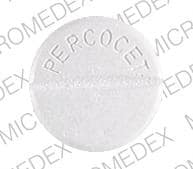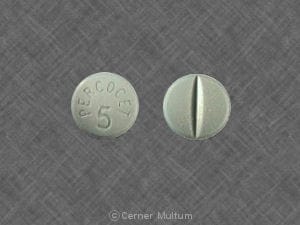What is Percocet?
Percocet is:
- A strong prescription pain medicine that contains an opioid (narcotic) that is used to manage pain, severe enough to require an opioid analgesic and for which alternative treatments are inadequate and when other pain treatments such as non-opioid pain medicines do not treat your pain well enough or you cannot tolerate them.
- An opioid pain medicine that can put you at risk for overdose and death. Even if you take your dose correctly as prescribed you are at risk for opioid addiction, abuse, and misuse that can lead to death.
What is the most important information I should know about Percocet?
- Get emergency help right away if you take too much Percocet (overdose). When you first start taking Percocet, when your dose is changed, or if you take too much (overdose), serious or life-threatening breathing problems that can lead to death may occur. Taking Percocet with other opioid medicines, benzodiazepines, alcohol, or other central nervous system depressants (including street drugs) can cause severe drowsiness, decreased awareness, breathing problems, coma, and death.
- Never give anyone else your Percocet. They could die from taking it. Store Percocet away from children and in a safe place to prevent stealing or abuse. Selling or giving away Percocet is against the law.
Who should not take Percocet?
Do not take Percocet if you have:
- Severe asthma, trouble breathing, or other lung problems.
- A bowel blockage or have narrowing of the stomach or intestines.
- Known hypersensitivity to oxycodone, acetaminophen, or any ingredient in Percocet.
What should I tell my healthcare provider before taking Percocet?
Before taking Percocet, tell your healthcare provider if you have a history of:
- Head injury, seizures
- Liver, kidney, thyroid problems
- Problems urinating
- Pancreas or gallbladder problems
- Abuse of street or prescription drugs, alcohol addiction, or mental health problems
Tell your healthcare provider if you are:
- Pregnant or planning to become pregnant. Prolonged use of Percocet during pregnancy can cause withdrawal symptoms in your newborn baby that could be life-threatening if not recognized and treated.
- Breastfeeding. Percocet passes into breast milk and may harm your baby.
- Taking prescription or over-the-counter medicines, vitamins, or herbal supplements. Taking Percocet with certain other medicines can cause serious side effects that could lead to death.
How should I take Percocet?
When taking Percocet:
- Do not change your dose. Take Percocet exactly as prescribed by your healthcare provider. Use the lowest dose possible for the shortest time needed.
- Take your prescribed dose every 6 hours as needed for pain. Do not take more than your prescribed dose. If you miss a dose, take your next dose at your usual time.
- Call your healthcare provider if the dose you are taking does not control your pain.
- If you have been taking Percocet regularly, do not stop taking Percocet without talking to your healthcare provider.
- After you stop taking Percocet, dispose of unused tablets by flushing them down the toilet.
What should I avoid while taking Percocet?
While taking Percocet do not:
- Drive or operate heavy machinery, until you know how Percocet affects you. Percocet can make you sleepy, dizzy, or lightheaded.
- Drink alcohol or use prescription or over-the-counter medicines that contain alcohol. Using products containing alcohol during treatment with Percocet may cause you to overdose and die.
What are the possible side effects of Percocet?
The possible side effects of Percocet include:
- constipation
- nausea
- sleepiness
- vomiting
- tiredness
- headache
- dizziness
- abdominal
- pain
Call your healthcare provider if you have any of these symptoms and they are severe.
Get emergency medical help if you have:
- trouble breathing
- shortness of breath
- fast heartbeat
- chest pain
- swelling of your face, tongue, or throat
- extreme drowsiness
- light-headedness when changing positions
- feeling faint
- agitation
- high body temperature
- trouble walking
- stiff muscles
- mental changes such as confusion
These are not all the possible side effects of Percocet. Call your doctor for medical advice about side effects.
You may report side effects to FDA at 1-800-FDA-1088. For more information go to dailymed.nlm.nih.gov.
Percocet Images
General information about the safe and effective use of Percocet
Medicines are sometimes prescribed for purposes other than those listed in a Medication Guide. Do not use Percocet for a condition for which it was not prescribed. Do not give Percocet to other people, even if they have the same symptoms you have. It may harm them. You can ask your healthcare provider or pharmacist for information about Percocet that was written for healthcare professionals.
How should I store Percocet?
- Store at 20º to 25ºC (68º to 77ºF)
- Protect from moisture
- Store in a tight, light-resistant container
- Keep out of reach of children
What are the ingredients in Percocet?
Active ingredients: oxycodone hydrochloride, acetaminophen
Inactive ingredients:
5mg tablets: silicon dioxide, croscarmellose sodium, crospovidone, cellulose microcrystalline, povidone, starch corn, stearic acid, FD&C blue No.1
7.5mg tablets: silicon dioxide, croscarmellose sodium, crospovidone, cellulose microcrystalline, povidone, starch corn, stearic acid, FD&C yellow No.6
10mg tablets: silicon dioxide, croscarmellose sodium, crospovidone, cellulose microcrystalline, povidone, starch corn, stearic acid, D&C yellow No. 10






